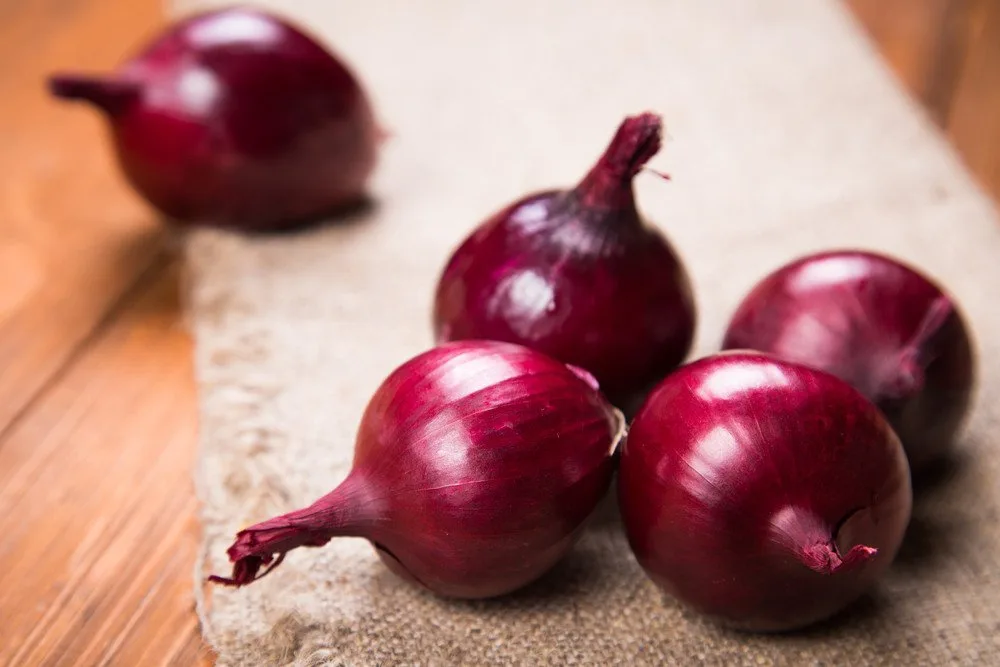When someone mentions superfoods, what do you think of? My list includes the powders and berries for sale at my local health shop or online: cacao, maca, goji berries, acai, camu camu… nothing I could grow myself or include in a “normal” meal. But, of course, not all superfoods are so exotic.
The Next Superfood
Broccoli is considered a superfood. According to the Cleveland Clinic, it can help you reduce your cancer risk, control your blood sugar, protect your gut, boost your immunity, and improve your heart health. [1] And don’t get me started on the sprouts – their detox powers are legendary!
Broccoli isn’t the only simple superfood; dark green veggies like spinach and kale fit the bill. Same with beets.
I’d like to suggest adding one more to the list: onions.
Why onions, you ask? Well, it’s not about any one thing. It’s the fact that they have so many amazing (but often little-known) health benefits.
Zhao et al. compiled an impressive list of its health functions in a 2021 review. [2] From helping you lose weight to protecting your liver, kidneys, heart, and brain, onions do it all.
They enhance the activity of antioxidant enzymes and reduce oxidative stress. They’re antibacterial, antifungal, and antiviral. (Onion essential oil inhibited the growth of Aspergillus, Fusarium, and Penicillium species.) They also fight inflammation. Researchers are even considering the possibility that anti-inflammatory substances from onions could be used in the treatment of Covid-19. [3] Their hypothesis is further supported by studies showing the effects of onion and its bioactive compounds on lung inflammation and other respiratory disorders.
Longevity Benefits of Onions
But there’s no need to venture into the realm of possibility; studies have demonstrated that onions and the compounds they contain have some truly impressive benefits. Here are just a few, courtesy of Zhao et al.:
- Onions fight obesity by reducing body weight and fat mass, as well as promoting the conversion of white fat into brown fat.
- Onions fight diabetes by lowering high blood sugar, improving insulin resistance, inhibiting enzymes that digest carbs, and increasing blood glucose levels after a meal.
- Onions fight cancer by reducing the proliferation of cancer cells and inducing apoptosis and autophagy.
- Onions protect the heart by improving cholesterol and triglyceride levels and inhibiting platelet aggregation. In rats fed a high-cholesterol diet, adding onion to the diet significantly increased the activity of antioxidant enzymes, enhanced anti-inflammatory response, and improved various cardiovascular risk markers.
- Onions protect the brain. They act against neural inflammation, reduce neuropathic pain, and exert neuroprotective effects against Parkinson’s disease, memory impairment, cerebral injury, and retinal damage.
- Onions protect the respiratory system. They improve allergic asthma [4], reduce lung inflammation, and lessen lung damage. Onionin A, a bioactive compound found in onions, inhibited the spread of tumors to the lungs of mice.
- Onions protect the liver and kidneys. Red onion peel extract protected rats’ liver and kidney tissues from drug-induced oxidative stress. The use of red onion scale extract improved diabetic neuropathy in rats. In humans, ALT (alanine aminotransferase) levels were significantly lower in those who included onions in their diet. High ALT levels indicate a damaged or inflamed liver.
- Onions protect the digestive system. They’ve mitigated gastric ulcers, improved colitis, and modulated the organisms in the gut microbiome. Onion bulb extract reduces the severity of colitis in mice, and onion helps to protect against cancers of the upper aerodigestive tract and the gastrointestinal tract.
- Onions protect the reproductive system against the effects of both infection and chemical toxicity, possibly improving fertility as well as the quality of both sperm and egg. Clinical trials using red onions showed benefits for women with polycystic ovarian syndrome. And on a lighter note, rats with drug-induced erectile dysfunction were cured with onion juice!
- Onions and their compounds regulate the immune system. Onionin A has been shown to prevent macrophages and tumor-related cells from suppressing the immune system. Onion extract improved white blood cell counts, enhanced antioxidant activity, and increased cytokine and immunoglobulin (IgG) levels in rats.
Bottom line
It’s clear that onion powder, juice, and extracts have plenty of health benefits – but there’s still so much we don’t know. The researchers say that, although we have some good info on raw onions, we need data on how cooked onions affect the body. We also need more human studies.
Zhao and the other researchers see the potential for both functional foods and nutraceuticals aimed at preventing and managing a host of conditions. In the meantime, it couldn’t hurt to add some onion to your diet!
References
- https://health.clevelandclinic.org/broccoli-benefits/
- https://pubmed.ncbi.nlm.nih.gov/34368207/
Zhao XX, Lin FJ, Li H, Li HB, Wu DT, Geng F, Ma W, Wang Y, Miao BH, Gan RY. Recent Advances in Bioactive Compounds, Health Functions, and Safety Concerns of Onion (Allium cepa L.). Front Nutr. 2021 Jul 22;8:669805. doi: 10.3389/fnut.2021.669805. PMID: 34368207; PMCID: PMC8339303. - https://www.ncbi.nlm.nih.gov/pmc/articles/PMC7735184/
Dorsch W, Ring J. Anti-inflammatory substances from onions could be an option for treatment of COVID-19 – a hypothesis. Allergo J. 2020;29(8):30-31. German. doi: 10.1007/s15007-020-2644-9. Epub 2020 Dec 18. PMID: 33343096; PMCID: PMC7735184. - https://www.frontiersin.org/articles/10.3389/fphar.2020.551683/full
El-Hashim AZ, Khajah MA, Orabi KY, Balakrishnan S, Sary HG, Abdelali AA. Onion bulb extract downregulates EGFR/ERK1/2/AKT signaling pathway and synergizes with steroids to inhibit allergic inflammation. Front Pharmacol. (2020) 11:551683. doi: 10.3389/fphar.2020.551683



![women [longevity live]](https://longevitylive.com/wp-content/uploads/2020/01/photo-of-women-walking-down-the-street-1116984-100x100.jpg)










